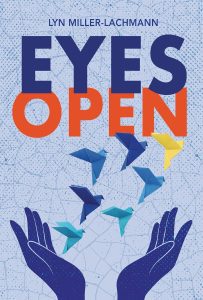Personal Responsibility
Near the beginning of my verse novel Eyes Open, my protagonist Sónia skips school to visit her boyfriend in prison. An activist against the repressive dictatorship that ruled Portugal from 1926 to 1974, 16-year-old Zé Miguel has been arrested for distributing banned books and other materials. Sónia has persuaded one of her sisters to lie to the nuns of their Catholic girls’ school about her whereabouts, something she used to do all the time when Zé Miguel was free and she cut classes to see him. This time, though, her sister fails to protect her, and her father is waiting with a belt when she returns:
I know my fate.
I deserve my fate.
I accept my fate.
Head high,
ready for the blows
across my cheeks
my mouth
my eyelids
I step forward
I am not afraid.
I agonized over the line, “I deserve my fate.” Sónia lives in a country where women and girls have little control over their lives. Those who are not part of the ruling elite live under strict constraints with little chance of bettering their lives, while members of the elite enjoy levels of comfort and safety unimaginable to the ordinary citizen. Nobody deserves to live under so much injustice. Nobody deserves to live in a place where their potential and their dreams are crushed because of who they are or the family they come from.
 Yet Sónia’s statement of deserving her fate comes from the fact that she knows the rules. She knows her society is unfair. She also loves her boyfriend and believes that visiting him in prison, “As Christ visited prisoners,” is the right thing to do. Her decision is an act of conscience, an act of resistance, and she will pay the price. She has also engaged her sister to lie for her, something for which she also takes responsibility even though she’s disappointed with her sister for snitching on her.
Yet Sónia’s statement of deserving her fate comes from the fact that she knows the rules. She knows her society is unfair. She also loves her boyfriend and believes that visiting him in prison, “As Christ visited prisoners,” is the right thing to do. Her decision is an act of conscience, an act of resistance, and she will pay the price. She has also engaged her sister to lie for her, something for which she also takes responsibility even though she’s disappointed with her sister for snitching on her.
I’ve thought a lot about this passage in the past several days, as the two major candidates vying to lead our country have failed to take responsibility for their decisions and actions and the inability of our institutions to hold them responsible. In one case, it’s obvious. The former president became the first losing candidate to obstruct the peaceful transfer of power. He did so through threats to local election officials using his bully pulpit as chief executive to do so, through the creation of false slates of electors in individual states he lost, and ultimately, through a violent assault on the Capitol to stop the certification of the election.
The current president and his family have also failed to take responsibility, in this case for the disastrous debate performance and his ineffectiveness in presenting his case for a second term with the stakes so high. Democracy is on the ballot through these two men — one who has demonstrated his desire to do away with it, to become a “dictator on day one” and one who believes in the 248-year-old “American experiment” and has done much to protect it but who has acted in ways during his campaign that call his competence into question. The history of the twentieth century is littered with enfeebled leaders who opened the door to monsters, Weimar Germany’s president Paul von Hindenburg being the most notorious example.
As a young adult during the 1980s, I heard the mantra of “personal responsibility.” Often, that idea of personal responsibility went only in one direction, and those whose generational wealth and choices were constrained due to slavery and Jim Crow, for instance, were held to a higher standard than those who’d benefitted from those arrangements.
Above all, though, personal responsibility means owning one’s decisions and actions, rather than making excuses or casting the blame to others. These days, I see a lot of blaming of immigrants for taking jobs, when non-immigrants are unwilling to work those jobs. It also means making amends for the harm one has caused and taking steps not to repeat the same mistakes. Sometimes it means sacrificing what is most dear, or even physical safety, to do what’s right. That’s the choice that Sónia makes when she visits her boyfriend in prison and endures a beating and the end of her school career. It’s the choice she continues to be faced with after she leaves school and goes to work at a full-time job under harsh and dangerous conditions.
On the way to their vacation after the infamous debate, the Bidens saw desperate people along the roadway holding signs reading “please drop out for us,” “we love you but it’s time,” and “step down for democracy.” Sometimes a loss of this magnitude means figuratively falling on one’s sword for the good of the population (and in this case, the planet) as a whole. Others can take up the task of running against the leader of the most violent and dangerous movement against American democracy since the remnants of the Southern slavocracy cajoled and hired thugs to massacre Black leaders and ordinary citizens to impose Jim Crow — what later became known as the Redemption. And the stakes this year are so much higher, with foreign dictators and would-be dictators in an unholy alliance to invade, occupy, and colonize smaller democratic nations, beginning with Ukraine. I can’t imagine anyone wanting to take up the mantle, which will expose them to constant criticism and second-guessing at the minimum and at the maximum, the kind of moral pain and personal peril that someone like Ukrainian president Volodymyr Zelenskyy faces every day.
I know that I’m just one more person holding up a sign (or in this case a blog), but I know what life is like in the kind of country Trump wants to establish and I know that important people will have to put their self-interest aside to stop him. That means taking personal responsibility for failures that cannot be undone and unifying under the best person to defend democracy going forward.







0 Comments
Trackbacks/Pingbacks